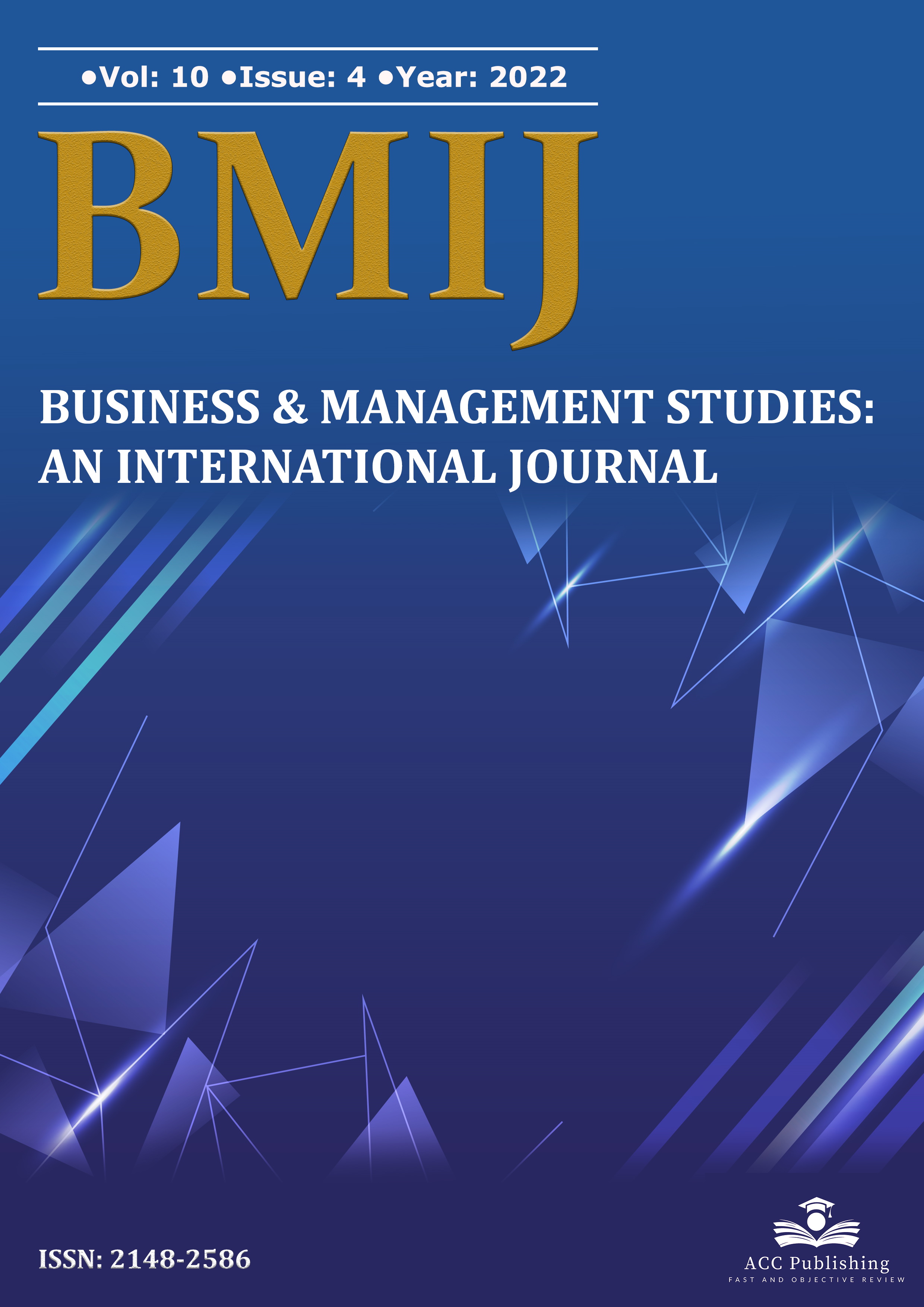Examining the attitude of trust towards the use of big data analysis in auditing: A qualitative study

Published 2022-12-25
Keywords
- Muhasebe Denetimi, Teknolojiye Güven Ölçeği, Büyük Veri Analizi
- Auditing, Trust in Technology Scale, Big Data Analysis
How to Cite
Copyright (c) 2022 Merve AYGÜN- Nilgün KUTAY

This work is licensed under a Creative Commons Attribution-NonCommercial-NoDerivatives 4.0 International License.
Abstract
This study aims to examine the attitude of trust regarding using big data analysis in the audit. A qualitative research method was adopted in the study. Semi-structured interview questions created using the Trust in Technology Scale were directed to 10 independent auditors. Trust attitude was examined under trust and belief in general technology, situational normality, structural assurance and belief in a particular technology, reliability, functionality and helpfulness. In the interviews with the participants, codes and categories were created according to the most intensely expressed thoughts. Maxqda 22 program was used in the analysis of the data. The trust attitudes of the independent auditors involved in the study towards general technology are tied to conditions such as control. There is a belief in general technology's positive contribution to business processes. Legal assurance makes participants feel safe. They are generally satisfied with working with big data analysis tools. The belief that big data analysis is functional, reliable and helpful in auditing is positive.
Downloads
References
- Bolonne, H., ve Wijewardene, P. (2020). “Critical Factors Affecting the Intention to Adopt Big Data Analytics in Apparel Sector, Sri Lanka”. International Journal of Advanced Computer Science and Applications 11(6).
- Chaudhary, K., ve Alam, M. ed. (2022). Big Data Analytics: Applications in Business and Marketing. First edition. Boca Raton, FL: CRC Press.
- Creswell, John W. (2002). Educational research: Planning, Conducting, and Evaluating Quantitative and Qualitative Research. C. 7. Prentice Hall Upper Saddle River, NJ.
- Creswell, John W. (2018). Nitel Araştırma Yöntemleri: Beş Yaklaşıma Göre Nitel Araştırma ve Araştırma Deseni. 6. baskı. Ankara: Siyasal Kitabevi.
- Creswell, J. W., ve Creswell, J. D. (2018). Research Design: Qualitative, Quantitative, and Mixed Methods Approaches. Fifth edition. Los Angeles: SAGE.
- Çarpar, M. C. (2020). “Sosyolojide İki Temel Niteliksel Desen: Fenomenolojik ve Etnografik Araştırma”. The journal of social science 4(8):689-704.
- Çelik, H., Baykal, N. B. ve Kılıç Memur, H. N. (2020). “Nitel veri analizi ve temel ilkeleri”. Eğitimde Nitel Araştırmalar Dergisi 8(1):379-406.
- Dagilienė, L., ve Klovienė, L. (2019). “Motivation to use big data and big data analytics in external auditing”. Managerial Auditing Journal.
- Goundar, S., Bhardwaj, A., Singh, S., Singh, M., ve Gururaj, H. L. (2021). “Big Data and Big Data Analytics: A Review of Tools and its Application”. Ss. 1-19 içinde Advances in Data Mining and Database Management, editör Goundar, S., ve Rayani., P. K. IGI Global.
- Gupta, M., ve George, J. F. (2016). “Toward the Development of A Big Data Analytics Capability”. Information & Management 53(8):1049-64.
- Güçlü, İ. (2021). Sosyal Bilimlerde Nitel Araştırma Yöntemleri: Teknik-Yaklaşım-Uygulama. Ankara: Nika Yayınevi.
- Imran, M., Ahamad, M. V., Haque, M. ve Shoaib, M. (2021). “Big Data Analytics Tools and Platform in Big Data Landscape”. Big Data Trends: Big Data Analytics Tools And Platform In Big Data Landscape: Big Data Industry.
- Liew, A., Boxall, P., ve Setiawan, D. (2022). “The Transformation to Data Analytics in Big-Four Financial Audit: What, Why and How?” Pacific Accounting Review (ahead-of-print).
- Madhlangobe, W. (2018). “Assessment of Factors Influencing Intent-to-Use Big Data Analytics in an Organization: A Survey Study”. Doktora Tezi, Nova Southeastern University, ABD.
- Mcknight, D. H., Carter, M., Thatcher, J.B., ve Clay, P. F. (2011). “Trust in A Specific Technology: An Investigation of Its Components and Measures”. ACM Transactions on management information systems (TMIS) 2(2):1-25.
- McKnight, H., Carter, M., ve Clay, P. (2009). “Trust in Technology: Development of A Set of Constructs and Measures”. Diffusion Interest Group in Informatıon Technology (DIGIT).
- Perera, M. C. D., ve Abeygunasekera, A. W. J. C. (2021). “Big Data and Big Data Analytics in External Auditing: Motivations and Challenges”. International Journal of Accounting & Business Finance 7(Special Issue):1-16.
- Saldana, J. (2022). “Nitel Araştırmacılar İçin Kodlama El Kitabı”. Pegem Akademi Yayıncılık.
- Sharma, R., Kaushik, M., Peious, S.A., Shahin, M., Vidyarthi, A., Tiwari, P., ve Draheim, D. (2022). “Why Not to Trust Big Data: Discussing Statistical Paradoxes”. Ss. 50-63. International Conference on Database Systems for Advanced Applications.
- Shukla, M., ve Mattar, L. (2019). “Next generation smart sustainable auditing systems using big data analytics: understanding the interaction of critical barriers”. Computers & Industrial Engineering 128:1015-26.
- Stensjö, G. (2020). “The Changing Nature of the Audit Profession, Opportunities and Challenges with Digital Transformation and the Use of Audit Support Systems, Big Data and Data Analytics”. Yüksek Lisans Tezi.
- Vaismoradi, M., Turunen, H., ve Bondas, T. (2013). “Content analysis and thematic analysis: Implications for conducting a qualitative descriptive study”. Nursing & health sciences 15(3):398-405.
- Vanbutsele, F. (2018). “The Impact of Big Data on Financial Statement Auditing”. Ghent Univercity, Belgium.
- Yıldırım, A., ve Şimşek, H. (2021). Sosyal Bilimlerde Nitel Araştırma Yöntemleri. 12.Baskı. Ankara: Seçkin Yayıncılık.


